The backyard is an exciting place to hang around. However, it can be a danger zone for our furry friends, when it comes to plants poisonous to dogs. But how is that possible? Well, many plants poisonous to dogs are found in the yard.
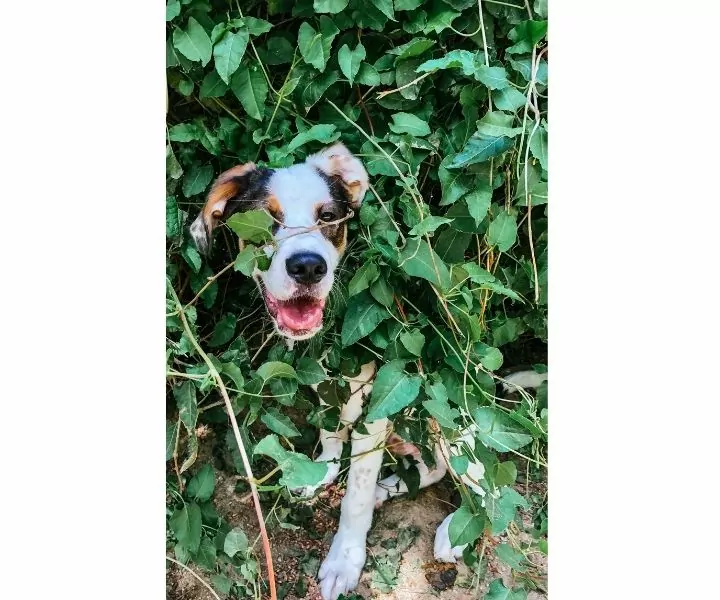
They range from being less toxic to serious health issues. Since dogs are always ready to nibble on any object, be sure to be extra careful while they are outside. Before letting out your pup, watch out for these yard plants poisonous to dogs.
The Dangers of Poisonous Plants to Your Dogs
There are varieties of plants poisonous to dogs in the backyard. Did you know that they can harm your little friend? Here are the dangers of those toxic plants.
- Vomiting and diarrhea.
- Kidney damage.
- Respiratory failure.
- Abdominal pain.
- Depression.
- Drooling and loss of appetite.
- Coma or even death.
A List of Plants Poisonous to Dogs
Some yard plants are dangerous to our beloved companions. Therefore, keep it safe by avoiding the following toxic plants that could send you for a trip to a vet clinic.
Cold Hardy Perennial Flowers
Cold Hardy Perennial flowers are gorgeous but also poisonous to pets. Here is a list.
Iris
The large, dwarf, and eye-catching flower is part of the spring bulb family. Moreover, it has tri-colored flowers with purple and yellow stripes. The plant is poisonous because it contains toxic compounds in the bulb, which causes uncomfortable symptoms such as diarrhea, drooling, vomiting, and lethargy.
Mums
The fast-growing Mums bloom to produce a wide array of flowers. While they might sound as lovely as a real mum, they are a no-go zone. One question that many pet owners probably have is, “are mums poisonous to dogs“?
Yes, mums are toxic to pets, particularly cats and dogs. According to the American Society for preventing animal cruelty, these fussy plants contain toxins, such as pyrethrin. When consumed by pets, they lead to skin inflammation, vomiting, diarrhea, drooling, and clumsiness.
Lily-of the-Valley
Lily of the valley is a flower with a pleasant smell. However, it’s not a true lily as it comes from the asparagus family. Furthermore, it’s not pet-friendly, especially the orange-colored berries, as they can cause heart problems, vomiting, excessive drooling, and diarrhea in pets.
Bleeding hearts
Just like the name suggests, this popular plant is dangerous. Being a shade-loving garden flower, it blooms well in the spring. However, it contains poisonous substances that might cause digestive upset and tremors.
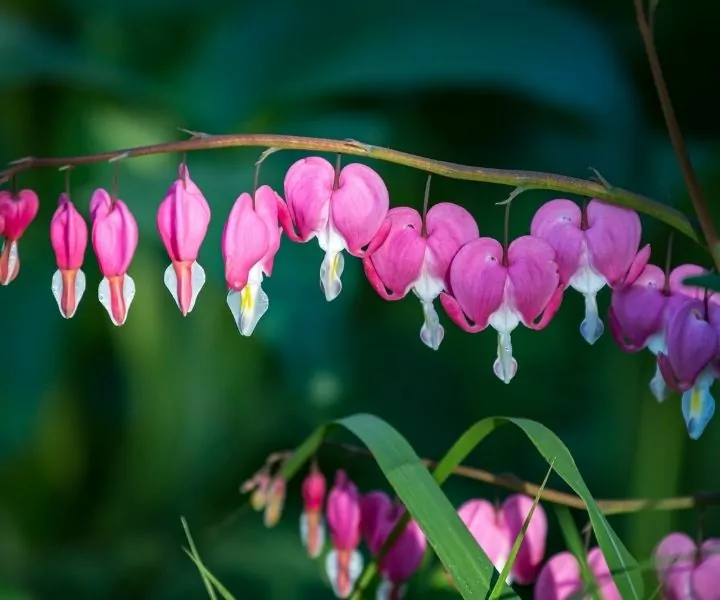
Vines
Vines are gorgeous plants, but a good number of them are poisonous. Among them are:
Morning Glory
Another garden plant poisonous to dogs is the Morning glory. It is a fascinating flower that is planted annually. The trumpet-shaped flowers share the same family with sweet potatoes. While it might be attractive, its seeds contain lysergic acid. Pets that ingest morning glory tend to hallucinate, have gastrointestinal problems, tremors and disorientation.
English Ivy
English Ivy is among the woody vines used as ornamental ground covers. Also known as common ivy, it can thrive in cold and low light conditions. It is among poisonous plants because it contains harmful substances that might cause vomiting, neurological problems, or diarrhea.
Wisteria
It is a perennial vine that bears fragrant flowers. The pods and seeds of Wisteria can be highly toxic when consumed. Nibbling glycoside wistaria might cause dizziness, diarrhea, confusion, nausea, and vomiting.
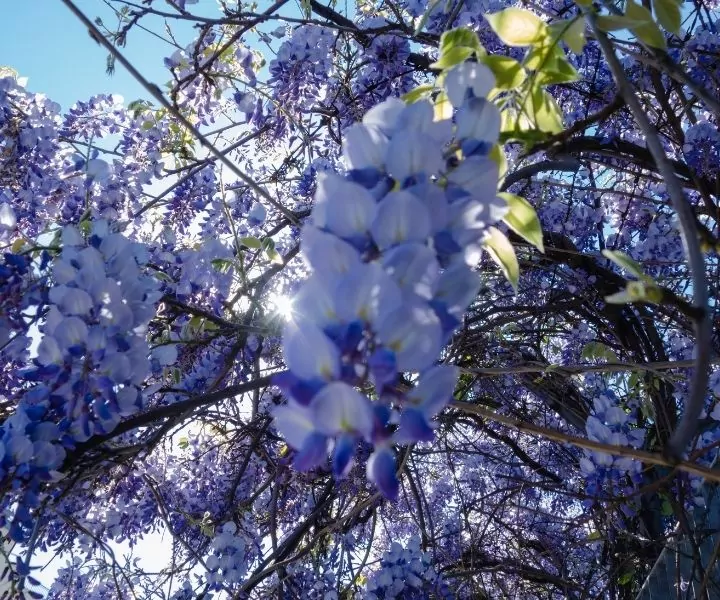
Boston Ivy
Boston ivy is well-known for climbing on almost anything. Moreover, it is used as an ornamental ground cover. This plant is dangerous to dogs and cats because it contains harmful substances. When ingested by your lovely canine, it might cause vomiting, dermatitis, and tummy upset.
Annuals
There are a lot of annual plants that are popular in hanging baskets. Some of them include:
Begonia
It is a genius plant from the Begoniaceae family. Some are grown inside as ornamental houseplants while others outside. This plant is not suitable for your dog. All parts are poisonous, but the stem and tubers are the most toxic. The versatile summer plant causes burning and irritation on the mouth, drooling, difficulties in swallowing, and vomiting.
Lantana
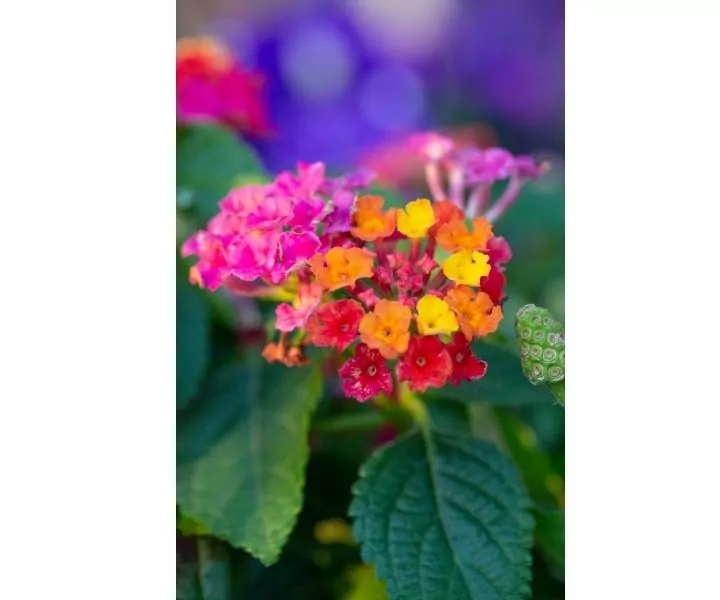
The lively Lantana is mainly planted in hanging baskets. It contains a mixture of flowers to create a bicolored effect. However, it is harmful to pets as it has high levels of toxins. When ingested by pups, it damages the hepatic system, causes vomiting, weakness, and depression.
Shrubs
Shrubs grow almost everywhere. They help in reshaping the yard. However, the following shrubs are poisonous to cats and dogs:
Yew Bushes
The Yew bushes have been around for decades. Although they are slow-growing, they eventually mature to be beautiful flowers. Commonly found in yards, they tend to be a perfect playing and hiding area for pets.
However, they are plants poisonous to dogs as they contain toxins. Clinical signs of vomiting, drooling, tremors, coma, and death may occur when ingested by dogs.
Privet
A privet is a group of bushes that are not edible. Their conspicuous heads and, most of all, blackberries might attract dogs. They contain terpenoid glycosides that might lead to losing appetite, have a rapid heartbeat, and stomach upset when eaten by your four-legged friend.
Burning Bush
Burning bush is a striking shrub that blooms for a long time. Just like the name, this deciduous plant bursts into a crimson color. As it may look brilliant, keep your dogs away from it since it contains toxic substances. When consumed, the dog might experience abdominal pain, vomiting, diarrhea, and weakness.
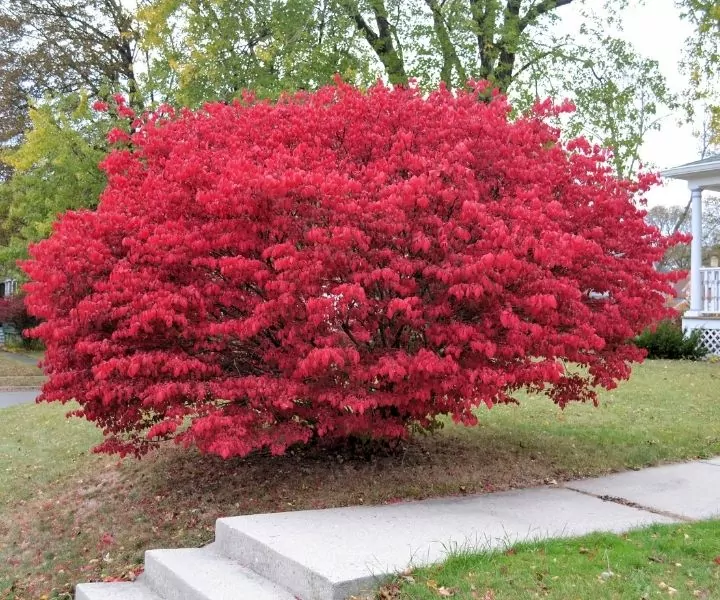
Rose of Sharon
Also known as hardy hibiscus, the rose of Sharon is a colorful flower that appears in red, pink, purple, and shades of white. The dazzling bush is a deadly plant since it contains toxins that lead to vomiting, loss of appetite, and nausea.
Trees
There are varieties of trees planted in the yard. Here are a few that are not safe.
Oak trees
Oak trees produce their foliage colors later in winter. These trees are dangerous to dogs because the acorns contain toxic tannic acid. Dogs that ingest these elements display vomiting, diarrhea, and abdominal comfort.
Golden chain
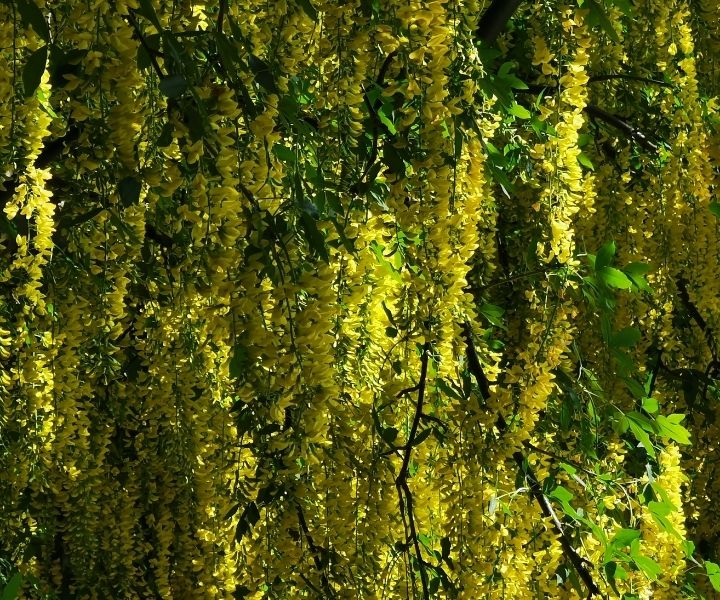
These gorgeous trees are not pet-friendly since they produce alkaloids that might cause vomiting, weakness, and incoordination when ingested by dogs.
Oleander
These flowering trees add beauty to your yard. However, they contain high toxicity levels from a compound called oleandrin which causes hypersalivation, vomiting, abdominal pain, and vomiting when consumed by your pup.
American holly
American holly is a beautiful tree that can grow in hardy zones. It is poisonous as it contains toxins that might cause diarrhea, vomiting, and severe gastrointestinal upset.
Bulb Plants
There are many bulb plants poisonous to dogs. Among them are:
Tulips
Tulips are flowering plants that can be dangerous to your dogs. They contain allergenic lactones, which, when consumed, leads to depression, vomiting, and diarrhea.
Lilies
Among the varieties of lilies are the peace lilies. They are beautiful and create a perfect landscape view. But are peace lilies poisonous to dogs? They contain alkaloids that damage the red blood cells, cause redness of the eye and mouth, and vomiting.
Allium
There are many varieties of allium, and some of them are used as ornamental flowers. However, they contain toxins that might cause hemolytic anemia, depression, and weakness when ingested by dogs.
Hyacinths
Hyacinths are famous for their fragrance and bright colors. They can be poisonous to dogs as they contain toxic elements which might cause nausea, vomiting, increased heart rate, and drooling.
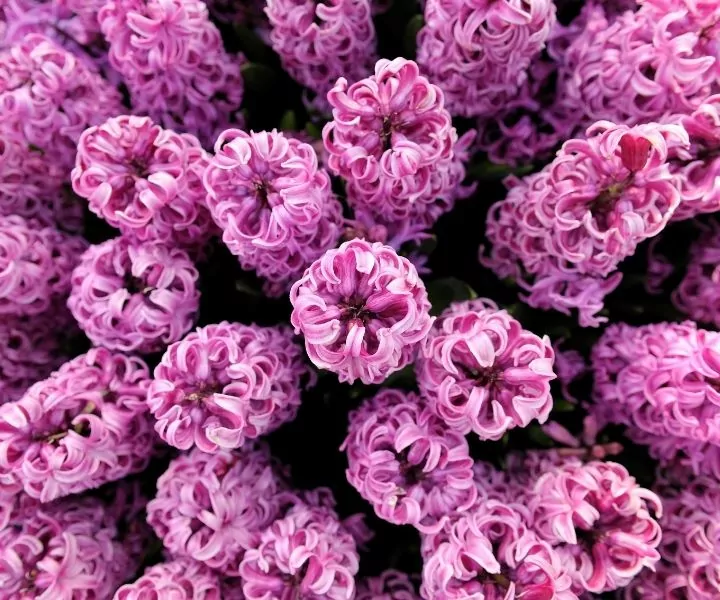
Tropical Plants
These plants are grown from their flowers. Some of the poisonous ones are:
Elephant ears
Just like the name, they have big leaves. But are elephant ears poisonous to dogs? Yes, they contain insoluble calcium oxalate acid, which might cause tearing eyes, inflation, and burning of the skin, among others.
Snake lily
Also known as the devil’s tongue, it contains toxins that cause dogs to suffer from nausea, drooling, vomiting, and diarrhea.
Aloe Vera
Although it is used in skin-care products, the raw plant is poisonous to pups as it can cause vomiting, diarrhea, and lethargy.
Castor bean
Castor bean is a tall, tropical, and toxic plant. It contains ricin which makes the dog vomit, suffer from mouth irritation and diarrhea.
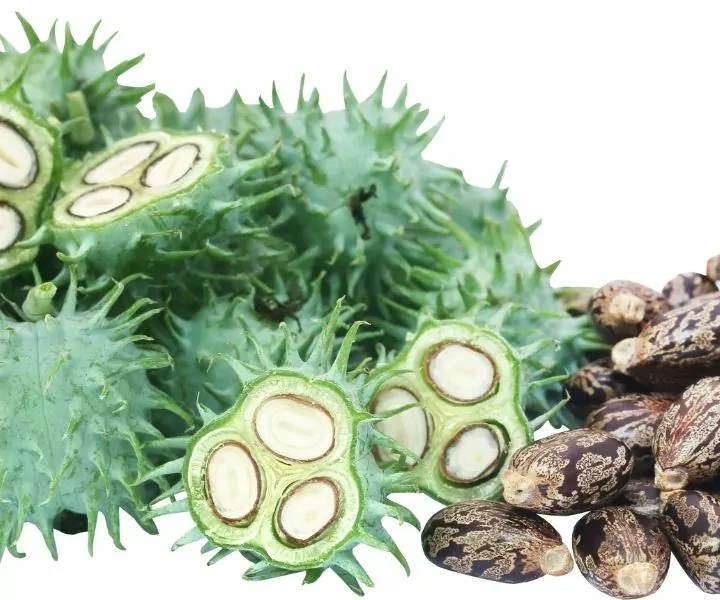
Weeds and Other Wild Plants
Weeds and wild plants are always known to be inedible. Among them are:
Mistletoe
Although it’s used in Christmas decorations, it contains alkaloids making your little pup drool, vomit, and have diarrhea.
Yellow dork
Yellow dork is used to treating stinging nettle burn. However, it contains neurotoxicity, which leads to depression, a weak pulse, and drooling.
Baneberry
This plant grows in the wildflower garden, but it’s not safe for dogs. It contains a toxin that might cause vomiting, diarrhea, and stomach upset.
Bloodroot
It is a famous garden portraying a striking visual interest. Also known as the doll’s eye, it contains toxins that might cause vomiting, diarrhea, unconsciousness, and lethargy when ingested by dogs.
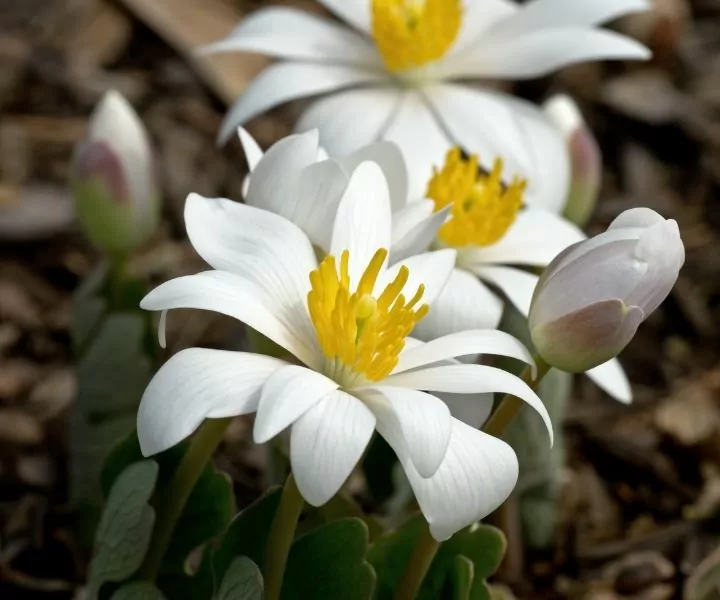
Signs That My Dog Ate a Poisonous Plant
Our beloved companions are incredibly vigilant, and that is why they tend to eat almost anything. A good percentage of yard plants are poisonous to dogs and cats. If you suspect that your puppy is poisoned, Check out the following signs.
- Excessive sweating
- Breathing problem
- Vomiting and diarrhea
- Increased heartbeat
- Muscle tremor
- Stomach upset
- Weakness
- Coma
How to Pet-Proof Your Yard or Garden
Pet proofing is an effective way to protect your little pup from harmful plants. If your pet spends a lot of time outdoors, be sure to employ the following tips.
- Fence the Yard
Your canine buddy loves going outside. As they desire to help you tour and water your garden, remember to fence to prevent puppies from jumping over it.
- Get Rid of Toxic Plants in Your Yard
Keeping a dog is a lovely experience. From cuddles and kisses to crawling all over the place. But did you know that it’s crucial to have a list of toxic plants? Well, it is essential to remove these plants from your yard because your cold-nosed friend might mistake them for a born or snack.
If your puppy likes to play in the yard, ensure that the pet-safe plants are not treated with pesticides, fertilizers, or insecticides.
- Designate a Puppy Area
Setting aside a playing area away from the yard will prevent your puppies from running around. Moreover, you can put playing toys in the area set aside to help keep them busy.
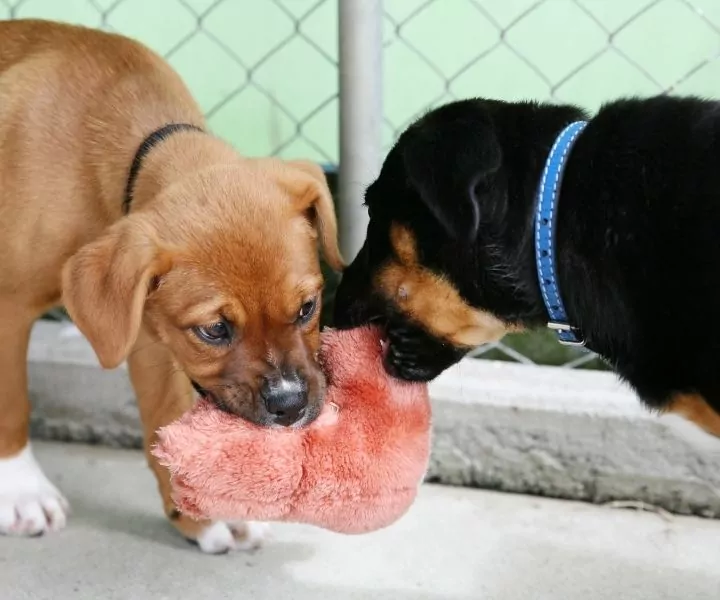
- Supervise Your Puppies
Puppies are fun to play with and like to jump around a lot. This makes it hard to restrict them from outside activities. Therefore, it is best to supervise them whenever they are outside.
What Should You Do When Your Dog Consumes a Poisonous Plant?
Pet plant poisoning can be an emergency. If you suspect that your little fluff has consumed a poisonous plant, call your veterinarian immediately. If your puppy is vomiting, they might recommend that you give your dog milk, hydrogen peroxide, or water.
You can also have a plan to save your dog’s life whenever he or she consumes poison. Alternatively, you can call the pet poison helpline. Your vet might ask you to bring your pet to the health facility for further treatment and checkups.
For better results, tell the doctor the exact plant consumed. If you don’t know, carry a sample of the dog’s vomit to help administer treatment.
The Animal Poison Control Hotline
Did your pet consume a poisonous plant? Don’t worry. The American Society for the Prevention of Cruelty for Dogs (ASCPA) is here for you. Henry Bergh founded it on the belief that animals are entitled to fair treatment at the hands of humans.

Furthermore, it contains a list of ASPCA plants poisonous to dogs scientifically proven to have side effects. If your pet has ingested poison, contact your local vet or call the pet poison helpline at (885) 426-4435.
